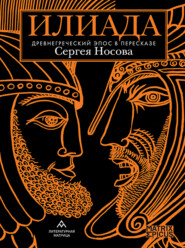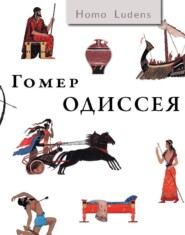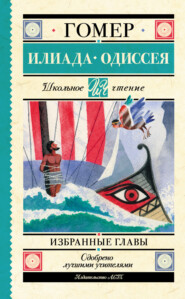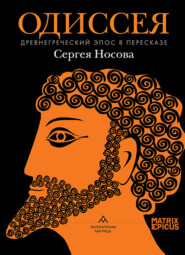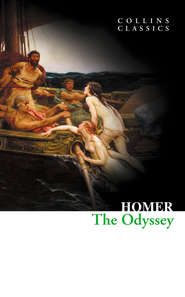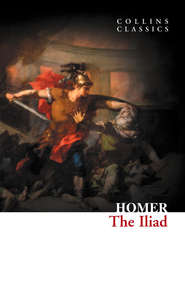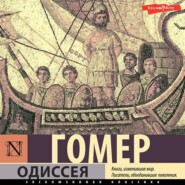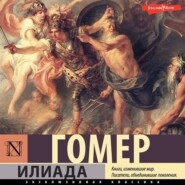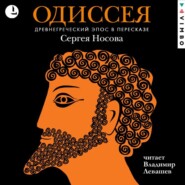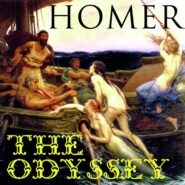По всем вопросам обращайтесь на: info@litportal.ru
(©) 2003-2024.
✖
The Iliad
Настройки чтения
Размер шрифта
Высота строк
Поля
Now when they had come among the assembled sentinels, they found not the leaders of the sentinels asleep, but they all sat wide awake with their arms. And even as hounds keep difficult guard round the sheep in a fold, having heard a hardy wild beast that cometh through the wood among the hills, and much clamour riseth round him of hounds and men, and sleep perisheth from them, even so sweet sleep did perish from their eyes, as they watched through the wicked night, for ever were they turning toward the plains, when they heard the Trojans moving.
And that old man was glad when he saw them, and heartened them with his saying, and calling out to them he spake winged words: "Even so now, dear children, do ye keep watch, nor let sleep take any man, lest we become a cause of rejoicing to them that hate us."
So saying he sped through the moat, and they followed with him, the kings of the Argives, who had been called to the council. And with them went Meriones, and the glorious son of Nestor, for they called them to share their counsel. So they went clean out of the delved foss, and sat down in the open, where the mid-space was clear of dead men fallen, where fierce Hector had turned again from destroying the Argives, when night covered all. There sat they down, and declared their saying each to the other, and to them knightly Nestor of Gerenia began discourse: "O friends, is there then no man that would trust to his own daring spirit, to go among the great-hearted Trojans, if perchance he might take some straggler of the enemy, yea, or hear perchance some rumour among the Trojans, and what things they devise among themselves, whether they are fain to abide there by the ships, away from the city, or will retreat again to the city, now that they have conquered the Achaians? All this might such an one learn, and back to us come scathless: great would be his fame under heaven among all men, and a goodly gift will be given him. For all the best men that bear sway by the ships, each and all of them will give him a black ewe, with her lamb at her foot, and ever will he be present at feasts and clan-drinkings."
So spake he, and thereon were they all silent, holding their peace, but to them spake Diomedes of the loud war-cry: "Nestor, my heart and manful spirit urge me to enter the camp of the foemen hard by, even of the Trojans: and if some other man will follow with me, more comfort and more courage will there be. If two go together, one before another perceiveth a matter, how there may be gain therein; but if one alone perceive aught, even so his wit is shorter, and weak his device."
So spake he, and many were they that wished to follow Diomedes. The two Aiantes were willing, men of Ares' company, and Meriones was willing, and right willing the son of Nestor, and the son of Atreus, Menelaos, spearman renowned, yea and the hardy Odysseus was willing to steal into the throng of Trojans, for always daring was his heart within him. But among them spake the king of men, Agamemnon: "Diomedes son of Tydeus, joy of mine heart, thy comrade verily shalt thou choose, whomsoever thou wilt, the best of them that be here, for many are eager. But do not thou, out of reverent heart, leave the better man behind, and give thyself the worse companion, yielding to regard for any, and looking to their lineage, even if one be more kingly born."
So spake he, but was in fear for the sake of fair-haired Menelaos. But to them again answered Diomedes of the loud war-cry: "If indeed ye bid me choose myself a comrade, how then could I be unmindful of godlike Odysseus, whose heart is passing eager, and his spirit so manful in all manner of toils; and Athene loveth him. But while he cometh with me, even out of burning fire might we both return, for he excelleth in understanding."
Then him again answered the steadfast noble Odysseus: "Son of Tydeus, praise me not overmuch, neither blame me aught, for thou speakest thus among the Argives that themselves know all. But let us be going, for truly the night is waning, and near is the dawn, and the stars have gone onward, and the night has advanced more than two watches, but the third watch is yet left."
So spake they, and harnessed them in their dread armour. To the son of Tydeus did Thrasymedes steadfast in war give a two-edged sword (for his own was left by his ship) and a shield, and about his head set a helm of bull's hide, without cone or crest, that is called a skull-cap, and keeps the heads of stalwart youths. And Meriones gave Odysseus a bow and a quiver, and a sword, and on his head set a helm made of leather, and with many a thong was it stiffly wrought within, while without the white teeth of a boar of flashing tusks were arrayed thick set on either side, well and cunningly, and in the midst was fixed a cap of felt.
So when these twain had harnessed them in their dread armour, they set forth to go, and left there all the best of the host. And to them did Pallas Athene send forth an omen on the right, a heron hard by the way, and they beheld it not with their eyes, through the dark night, but they heard its shrill cry. And Odysseus was glad in the omen of the bird, and prayed to Athene: "Listen to me, thou child of aegis-bearing Zeus, that ever in all toils dost stand by me, nor doth any motion of mine escape thee: but now again above all be thou friendly to me, Athene, and grant that we come back with renown to the ships, having wrought a great work, that shall be sorrow to the Trojans."
Next again prayed Diomedes of the loud war-cry: "Listen now likewise to me, thou child of Zeus, unwearied maiden, and follow with me as when with my father thou didst follow, even noble Tydeus, into Thebes, when he went forth as a messenger from the Achaians. Even so now stand thou by me willingly, and protect me. And to thee will I sacrifice a yearling heifer, broad of brow, unbroken, that never yet hath man led below the yoke. Her will I sacrifice to thee, and gild her horns with gold."
So spake they in their prayer, and Pallas Athene heard them. And when they had prayed to the daughter of mighty Zeus, they went forth on their way, like two lions, through the dark night, amid the slaughter, amid the slain men, through the arms and the black blood.
Nay, nor the stout-hearted Trojans did Hector suffer to sleep, but he called together all the best of them, all that were chiefs and leaders of the Trojans, them did he call together, and contrived a crafty counsel: "Who is there that would promise and perform for me this deed, for a great gift? yea his reward shall be sufficient. For I will give him a chariot, and two horses of arching neck, the best that be at the swift ships of the Achaians, to whosoever shall dare the deed, and for himself shall win glory. And the deed is this; to go near the swift-faring ships, and seek out whether the swift ships are guarded, as of old, or whether already, being subdued beneath our hands, the foes are devising of flight among themselves, and have no care to watch through the night, being fordone with dread weariness."
So spake he, but they were all silent and held their peace. Now there was among the Trojans one Dolon, the son of Eumedes the godlike herald, and he was rich in gold, and rich in bronze: and verily he was ill favoured to look upon, but swift of foot. So he spake then a word to the Trojans and to Hector: "Hector, my heart and manful spirit urge me to go near the swift-faring ships, and spy out all. But come, I pray thee, hold up the staff, and swear to me, that verily thou wilt give me the horses and the chariots bedight with bronze that bear the noble son of Peleus. But to thee I will prove no vain spy, nor disappoint thy hope. For I will go straight to the camp, until I may come to the ship of Agamemnon, where surely the chiefs are like to hold council, whether to fight or flee."
So spake he, and Hector took the staff in his hand, and sware to him: "Now let Zeus himself be witness, the loud-thundering lord of Hera, that no other man of the Trojans shall mount those horses, but thou, I declare, shalt rejoice in them for ever."
So spake he, and sware a bootless oath thereto, and aroused Dolon to go. And straightway he cast on his shoulders his crooked bow, and did on thereover the skin of a grey wolf, and on his head a helm of ferret-skin, and took a sharp javelin, and went on his way to the ships from the host. But he was not like to come back from the ships and bring word to Hector.
But when he had left the throng of men and horses, he went forth eagerly on the way, and Odysseus of the seed of Zeus was ware of him as he approached, and said unto Diomedes: "Lo, here is some man, Diomedes, coming from the camp, I know not whether as a spy to our ships, or to strip certain of the dead men fallen. But let us suffer him to pass by us a little way on the plain, and thereafter may we rush on him and take him speedily, and if it chance that he outrun us by speed of foot, ever do thou hem him in towards the ships and away from the camp, rushing on him with thy spear, lest in any wise he escape towards the city."
So they spake, and turning out of the path they lay down among the bodies of the dead; and swiftly Dolon ran past them in his witlessness. But when he was as far off as is the length of the furrow made by mules, these twain ran after him, and he stood still when he heard the sound, supposing in his heart that they were friends come from among the Trojans to turn him back, at the countermand of Hector. But when they were about a spear-cast off, or even less, he knew them for foe-men, and stirred his swift limbs to fly, and speedily they started in pursuit.
And as when two sharp-toothed hounds, well skilled in the chase, press ever hard on a doe or a hare through a wooded land, and it runs screaming before them, even so Tydeus' son and Odysseus the sacker of cities cut Dolon off from the host, and ever pursued hard after him. But when he was just about to come among the sentinels, in his flight towards the ships, then Athene poured strength into the son of Tydeus, that none of the mail-clad Achaians might boast himself the first to smite, and he come second. And strong Diomedes leaped upon him with the spear, and said: "Stand, or I shall overtake thee with the spear, and methinks that thou shalt not long avoid sheer destruction at my hand."
So spake he, and threw his spear, but of his own will he missed the man, and passing over his right shoulder the point of the polished spear stuck fast in the ground: and Dolon stood still, in great dread and trembling, and the teeth chattered in his mouth, and he was green with fear. Then the twain came up with him, panting, and gripped his hands, and weeping he spake: "Take me alive, and I will ransom myself, for within our house there is bronze, and gold, and smithied iron, wherefrom my father would do you grace with ransom untold, if he should learn that I am alive among the ships of the Achaians."
Then Odysseus of the many counsels answered him and said: "Take courage, let not death be in thy mind, but come speak and tell me truly all the tale, why thus from the host lost thou come all alone among the ships, through the black night, when other mortals are sleeping? Comest thou to strip certain of the dead men fallen, or did Hector send thee forth to spy out everything at the hollow ships, or did thine own spirit urge thee on?"
Then Dolon answered him, his limbs trembling beneath him: "With many a blind hope did Hector lead my wits astray, who vowed to give me the whole-hooved horses of the proud son of Peleus, and his car bedight with bronze: and he bade me fare through the swift black night, and draw nigh the foemen, and seek out whether the swift ships are guarded, as of old, or whether, already, being subdued beneath our hands, they are devising of flight among themselves, and have no care to watch through the night, being fordone with dread weariness."
And smiling thereat did Odysseus of the many counsels make him answer: "Verily now thy soul was set on great rewards, even the horses of the wise son of Aiakos, but hard are they for mortal men to master, and hard to drive, for any but Achilles only, whom a deathless mother bare. But come, tell me all this truly, all the tale: where when thou camest hither didst thou leave Hector, shepherd of the host, and where lie his warlike gear, and where his horses? And how are disposed the watches, and the beds of the other Trojans? And what counsel take they among themselves; are they fain to abide there nigh the ships afar from the city, or will they return to the city again, seeing that they have subdued unto them the Achaiana?"
Then Dolon son of Eumedes made him answer again: "Lo, now all these things will I recount to thee most truly. Hector with them that are counsellors holdeth council by the barrow of godlike Ilos, apart from the din, but as for the guards whereof thou askest, oh hero, no chosen watch nor guard keepeth the host. As for all the watch fires of the Trojans – on them is necessity, so that they watch and encourage each other to keep guard; but, for the allies called from many lands, they are sleeping and to the Trojans they leave it to keep watch, for no wise near dwell the children and wives of the allies." Then Odysseus of the many counsels answered him and said: "How stands it now, do they sleep amidst the horse-taming Trojans, or apart? tell me clearly, that I may know."
Then answered him Dolon son of Eumedes: "Verily all this likewise will I recount to thee truly. Towards the sea lie the Karians, and Paionians of the bended bow, and the Leleges and Kaukones, and noble Pelasgoi. And towards Thymbre the Lykians have their place, and the haughty Mysians, and the Phrygians that fight from chariots, and Maionians lords of chariots. But wherefore do ye inquire of me throughly concerning all these things? for if ye desire to steal into the throng of Trojans, lo, there be those Thracians, new comers, at the furthest point apart from the rest, and among them their king Rhesos, son of Eioneus. His be the fairest horses that ever I beheld, and the greatest, whiter than snow, and for speed like the winds. And his chariot is fashioned well with gold and silver, and golden is his armour that he brought with him, marvellous, a wonder to behold; such as it is in no wise fit for mortal men to bear, but for the deathless gods. But bring me now to the swift ships, or leave me here, when ye have bound me with a ruthless bond, that ye may go and make trial of me whether I have spoken to you truth, or lies."
Then strong Diomedes, looking grimly on him, said: "Put no thought of escape, Dolon, in thy heart, for all the good tidings thou hast brought, since once thou halt come into our hands. For if now we release thee or let thee go, on some later day wilt thou come to the swift ships of the Achaians, either to play the spy, or to fight in open war, but if subdued beneath my hands thou lose thy life, never again wilt thou prove a bane to the Argives."
He spake, and that other with strong hand was about to touch his chin, and implore his mercy, but Diomedes smote him on the midst of the neck, rushing on him with the sword, and cut through both the sinews, and the head of him still speaking was mingled with the dust. And they stripped him of the casque of ferret's skin from off his head, and of his wolf-skin, and his bended bow, and his long spear, and these to Athene the Giver of Spoil did noble Odysseus hold aloft in his hand, and he prayed and spake a word: "Rejoice, O goddess, in these, for to thee first of all the immortals in Olympus will we call for aid; nay, but yet again send us on against the horses and the sleeping places of the Thracian men."
So spake he aloud, and lifted from him the spoils on high, and set them on a tamarisk bush, and raised thereon a mark right plain to see, gathering together reeds, and luxuriant shoots of tamarisk, lest they should miss the place as they returned again through the swift dark night.
So the twain went forward through the arms, and the black blood, and quickly they came to the company of Thracian men. Now they were slumbering, fordone with toil, but their goodly weapons lay by them on the ground, all orderly, in three rows, and by each man his pair of steeds. And Rhesos slept in the midst, and beside him his swift horses were bound with thongs to the topmost rim of the chariot. Him Odysseus spied from afar, and showed him unto Diomedes: "Lo, Diomedes, this is the man, and these are the horses whereof Dolon that we slew did give us tidings. But come now, put forth thy great strength; it doth not behove thee to stand idle with thy weapons: nay, loose the horses; or do thou slay the men, and of the horses will I take heed."
So spake he, and into that other bright-eyed Athene breathed might, and he began slaying on this side and on that, and hideously went up their groaning, as they were smitten with the sword, and the earth was reddened with blood. And like as a lion cometh on flocks without a herdsman, on goats or sheep, and leaps upon them with evil will, so set the son of Tydeus on the men of Thrace, till he had slain twelve. But whomsoever the son of Tydeus drew near and smote with the sword, him did Odysseus of the many counsels seize by the foot from behind, and drag him out of the way, with this design in his heart, that the fair-maned horses might lightly issue forth, and not tremble in spirit, when they trod over the dead; for they were not yet used to dead men. But when the son of Tydeus came upon the king, he was the thirteenth from whom he took sweet life away, as he was breathing hard, for an evil dream stood above his head that night through the device of Athens. Meanwhile the hardy Odysseus loosed the whole-hooved horses, and bound them together with thongs, and drave them out of the press, smiting them with his bow, since he had not taken thought to lift the shining whip with his hands from the chariot; then he whistled for a sign to noble Diomedes.
But Diomedes stood and pondered what most daring deed he might do, whether he should take the chariot, where lay the armour, and drag it out by the pole, or lift it upon high, and so bear it forth, or whether he should take the life away from yet more of the Thracians. And while he was pondering this in his heart, then Athene drew near, and stood, and spake to noble Diomedes: "Bethink thee of returning, O son of great-hearted Tydeus, to the hollow ships, lest perchance thou come thither in flight, and perchance another god rouse up the Trojans likewise."
So spake she, and he observed the voice of the utterance of the goddess, and swiftly he sprang upon the steeds, and Odysseus smote them with his bow, and they sped to the swift ships of the Achaians.
Nay, nor a vain watch kept Apollo of the silver bow, when he beheld Athene caring for the son of Tydeus; in wrath against her he stole among the crowded press of Trojans, and aroused a counsellor of the Thracians, Hippokoon, the noble kinsman of Rhesos. And he started out of sleep, when he beheld the place desolate where the swift horses had stood, and beheld the men gasping in the death struggle; then he groaned aloud, and called out by name to his comrade dear. And a clamour arose and din unspeakable of the Trojans hasting together, and they marvelled at the terrible deeds, even all that the heroes had wrought, and had gone thereafter to the hollow ships.
But when those others came to the place where they had slain the spy of Hector, there Odysseus, dear to Zeus, checked the swift horses, and Tydeus' son, leaping to the ground, set the bloody spoil in the hands of Odysseus, and again mounted, and lashed the horses, and they sped onward nothing loth. But Nestor first heard the sound, and said: "O friends, leaders and counsellors of the Argives, shall I be wrong or speak sooth? for my heart bids me speak. The sound of swift-footed horses strikes upon mine ears. Would to god that Odysseus and that strong Diomedes may even instantly be driving the whole-hooved horses from among the Trojans; but terribly I fear in mine heart lest the bravest of the Argives suffer aught through the Trojans' battle din."
Not yet was his whole word spoken, when they came themselves, and leaped down to earth, but gladly the others welcomed them with hand-clasping, and with honeyed words. And first did knightly Nestor of Gerenia make question: "Come, tell me now, renowned Odysseus, great glory of the Achaians, how ye twain took those horses? Was it by stealing into the press of Trojans? Or did some god meet you, and give you them? Wondrous like are they to rays of the sun. Ever with the Trojans do I mix in fight, nor methinks do I tarry by the ships, old warrior as I am. But never yet saw I such horses, nor deemed of such. Nay, methinks some god must have encountered you and given you these. For both of you doth Zeus the cloud-gatherer love, and the maiden of aegis-bearing Zeus, bright-eyed Athene."
And him answered Odysseus of the many counsels: "O Nestor, son of Neleus, great glory of the Achaians, lightly could a god, if so he would, give even better steeds than these, for the gods are far stronger than we. But as for these new-come horses, whereof, old man, thou askest me, they are Thracian, but their lord did brave Diomedes slay, and beside him all the twelve best men of his company. The thirteenth man was a spy we took near the ships, one that Hector and the other haughty Trojans sent forth to pry upon our camp."
So spake he, and drave the whole-hooved horses through the foss, laughing; and the other Achaians went with him joyfully. But when they had come to the well-built hut of the son of Tydeus, they bound the horses with well-cut thongs, at the mangers where the swift horses of Diomedes stood eating honey-sweet barley.
And Odysseus placed the bloody spoils of Dolon in the stern of the ship, that they might make ready a sacred offering to Athene. But for themselves, they went into the sea, and washed off the thick sweat from shins, and neck, and thighs. But when the wave of the sea had washed the thick sweat from their skin, and their hearts revived again, they went into polished baths, and were cleansed.
And when they had washed, and anointed them with olive oil, they sat down at supper, and from the full mixing bowl they drew off the honey-sweet wine, and poured it forth to Athene.
BOOK XI
Now Dawn arose from her couch beside proud Tithonos, to bring light to the immortals and to mortal men. But Zeus sent forth fierce Discord unto the fleet ships of the Achaians, and in her hands she held the signal of war. And she stood upon the huge black ship of Odysseus, that was in the midst, to make her voice heard on either side, both to the huts of Aias, son of Telamon, and to the huts of Achilles, for these twain, trusting in their valour and the might of their hands, had drawn up their trim ships at the two ends of the line. There stood the goddess and cried shrilly in a great voice and terrible, and mighty strength she set in the heart of each of the Achaians, to war and fight unceasingly. And straightway to them war grew sweeter than to depart in the hollow ships to their dear native land.
Then each man gave in charge his horses to his charioteer, to hold them in by the foss, well and orderly, and themselves as heavy men at arms were hasting about, being harnessed in their gear, and unquenchable the cry arose into the Dawn. And long before the charioteers were they arrayed at the foss, but after them a little way came up the drivers. And among them the son of Kronos aroused an evil din, and from above rained down dew danked with blood out of the upper air, for that he was about to send many strong men down to Hades.
But the Trojans on the other side, on the high ground of the plain, gathered them around great Hector, and noble Polydamus, and Aineias that as a god was honoured by the people of the Trojans, and the three sons of Antenor, Polybos, and noble Agenor, and young Akamas like unto the immortals. And Hector in the foremost rank bare the circle of his shield. And as from amid the clouds appeareth glittering a baneful star, and then again sinketh within the shadowy clouds, even so Hector would now appear among the foremost ranks, and again would be giving command in the rear, and all in bronze he shone, like the lightning of aegis-bearing father Zeus.
And even as when reapers over against each other drive their swaths through a rich man's field of wheat or barley, and thick fall the handfuls, even so the Trojans and Achaians leaped upon each other, destroying, and neither side took thought of ruinous flight; and equal heads had the battle, and they rushed on like wolves. And woful Discord was glad at the sight, for she alone of the gods was with them in the war; for the other gods were not beside them, but in peace they sat within their halls, where the goodly mansion of each was builded in the folds of Olympus. And they all were blaming the son of Kronos, lord of the storm-cloud, for that he willed to give glory to the Trojans. But of them took the father no heed, but aloof from the others he sat apart, glad in his glory, looking toward the city of the Trojans, and the ships of the Achaians, and the glitter of bronze, and the slayers and the slain.
So long as morning was, and the sacred day still waxed, so long did the shafts of both hosts strike, and the folk fell, but about the hour when a woodman maketh ready his meal, in the dells of a mountain, when he hath tired his hands with felling tall trees, and weariness cometh on his soul, and desire of sweet food taketh his heart, even then the Danaans by their valour brake the battalions, and called on their comrades through the lines. And in rushed Agamemnon first of all, where thickest clashed the battalions, there he set on, and with him all the well-greaved Achaians. Footmen kept slaying footmen as they were driven in flight, and horsemen slaying horsemen with the sword, and from beneath them rose up the dust from the plain, stirred by the thundering hooves of horses. And the lord Agamemnon, ever slaying, followed after, calling on the Argives. And as when ruinous fire falleth on dense woodland, and the whirling wind beareth it everywhere, and the thickets fall utterly before it, being smitten by the onset of the fire, even so beneath Agamemnon son of Atreus fell the heads of the Trojans as they fled; and many strong-necked horses rattled empty cars along the highways of the battle, lacking their noble charioteers; but they on the earth were lying, far more dear to the vultures than to their wives. But Hector did Zeus draw forth from the darts and the dust, from the man-slaying, and the blood, and the din, and the son of Atreus followed on, crying eagerly to the Danaans. And past the tomb of ancient Ilos, son of Dardanos, across the mid plain, past the place of the wild fig-tree they sped, making for the city, and ever the son of Atreus followed shouting, and his invincible hands were defiled with gore. But when they were come to the Skaian gates, and the oak-tree, there then they halted, and awaited each other. But some were still in full flight through the mid plain, like kine that a lion hath scattered, coming on them in the dead of night; all hath he scattered, but to one sheer death appeareth instantly, and he breaketh her neck first, seizing her with strong teeth, and thereafter swalloweth greedily the blood and all the guts; even so lord Agamemnon son of Atreus followed hard on the Trojans, ever slaying the hindmost man, and they were scattered in flight, and on face or back many of them fell from their chariots beneath the hands of Agamemnon, for mightily he raged with the spear. But when he was nowabout coming below the city, and the steep wall, then did the father of men and gods sit him down on the crests of many-fountained Ida, from heaven descending, with the thunderbolt in his hands.
Then sent he forth Iris of the golden wings, to bear his word: "Up and go, swift Iris, and tell this word unto Hector: So long as he sees Agamemnon, shepherd of the host, raging among the foremost fighters, and ruining the ranks of men, so long let him hold back, but bid the rest of the host war with the foe in strong battle. But when, or smitten with the spear or wounded with arrow shot, Agamemnon leapeth into his chariot, then will I give Hector strength to slay till he come even to the well-timbered ships, and the sun go down, and sacred darkness draw on."
So swift-footed Iris spake to Hector the words of Zeus and departed, but Hector with his harness leaped from the chariot to the ground, and, shaking his sharp spears went through all the host, stirring up his men to fight, and he roused the dread din of battle. And they wheeled round, and stood and faced the Achaians, while the Argives on the other side strengthened their battalions. And battle was made ready, and they stood over against each other, and Agamemnon first rushed in, being eager to fight far in front of all.
Tell me now, ye Muses that inhabit mansions in Olympus, who was he that first encountered Agamemnon, whether of the Trojans themselves, or of their allies renowned? It was Iphidamas, son of Antenor, great and mighty, who was nurtured in Thrace rich of soil, the mother of sheep; he it was that then encountered Agamemnon son of Atreus. And when they were come near in onset against each other, Atreus' son missed, and his spear was turned aside, but Iphidamas smote him on the girdle, below the corslet, and himself pressed on, trusting to his heavy hand, but pierced not the gleaming girdle, for long ere that the point struck on the silver, and was bent like lead. Then wide-ruling Agamemnon caught the spear with his hand and drew it toward him furiously, like a lion, and snatched it out of the hand of Iphidamas, and smote his neck with the sword, and unstrung his limbs. So even there he fell, and slept a sleep of bronze most piteously. Then did Agamemnon son of Atreus strip him, and went bearing his goodly harness into the throng of the Achaians.
Now when Koon beheld him, Koon Antenor's eldest son, illustrious among men, strong sorrow came on him, covering his eyes, for his brother's fall: and he stood on one side with his spear, and unmarked of noble Agamemnon smote him on the mid-arm, beneath the elbow, and clean through went the point of the shining spear. Then Agamemnon king of men shuddered, yet not even so did he cease from battle and war, but rushed against Koon, grasping his wind-nurtured spear. Verily then Koon seized right lustily by the foot Iphidamas, his brother, and his father's son, and called to all the best of his men; but him, as he dragged the dead through the press, beneath his bossy shield Agamemnon wounded with a bronze-shod spear, and unstrung his limbs, and drew near and cut off his head over Iphidamas. There the sons of Antenor, at the hands of Agamemnon the king, filled up the measure of their fate, and went down within the house of Hades.
But Agamemnon ranged among the ranks of men, with spear, and sword, and great stones for throwing, while yet the blood welled warm from his wound. But when the wound waxed dry, and the blood ceased to flow, then keen pangs came on the might of the son of Atreus. Then leaped he into his chariot, and bade his charioteer drive to the hollow ships, for he was sore vexed at heart. And he called in a piercing voice, and shouted to the Danaans: "O friends, leaders and counsellors of the Argives, do ye now ward from the seafaring ships the harsh din of battle, for Zeus the counsellor suffers me not all day to war with the Trojans."
So spake he, and his charioteer lashed the fair-maned steeds toward the hollow ships, and they flew onward nothing loth, and their breasts were covered with foam, and their bellies were stained with dust, as they bore the wounded king away from the war.






